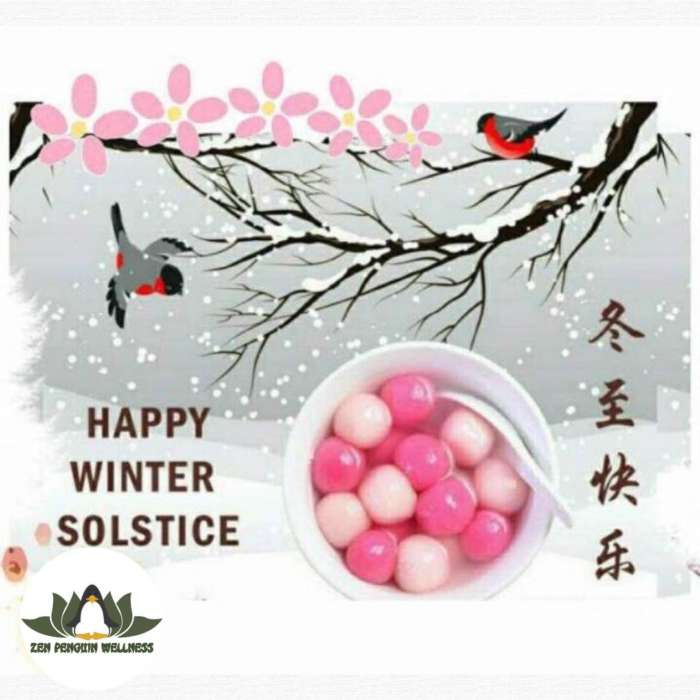
The winter solstice marks the shortest day of the year and the longest night of the year. The true yin nature of the year begins and we have to adapt and adjust until the longer, warmer days of spring and summer return. So why not end the calendar year with a bang? No, I’m not referring to New Year’s Eve. I’m actually referring to the Dongzhi Festival 冬至 that celebrates the winter solstice.
The Dongzhi Festival is one of the most important celebrations in Asia and this year it falls on December 21. The origins of this festival can be traced back to the yin and yang philosophy of balance and harmony in the cosmos. Yin represents darkness, cold and stillness, thus the longest day of winter. This is when yin is at its highest peak. Dongzhi marks the return of yang, with longer daylight hours and the slow ascendance of light and warmth. This also symbolizes the opportunity for renewal, a shedding of bad habits and negative feelings and an embracing of hope amid darkness, as the days once again begin to grow longer.
Traditionally, the Dongzhi Festival is also a time for the family to get together. It is the best time of the year to eat foods that nourish and tonify the body. Dumplings are usually eaten to celebrate in some East Asian cultures. In the southern regions of China, one activity that occurs during these get togethers, is the making and eating of tangyuan (湯圓) or balls of glutinous rice, which symbolize reunion. Foods that are warming and hearty are also recommended during the winter months.
Winter, in East Asian Medicine, is associated with the kidneys, which hold our body’s most basic and fundamental energy. It is believed that by harmonizing oneself with the seasons you can stay healthier and prevent disease, therefore winter is a good time to strengthen the kidneys. Rest is important for revitalizing the kidneys, which is why some animals hibernate in the winter. It is also a good time to look inward, reflecting on ourselves with meditation, writing or other inward practices such as tai chi and qi gong. These practices help us connect to our inner selves and support kidney energy. They are very helpful to relax the mind, calm our emotions and raise the spirit.
The sense organ associated with the kidneys is the ears, and our ability to hear clearly is related to kidney health. The quiet and stillness of winter allows us to hear more of the world than the buzzing activities of summer. This forces us to slow down, rest and relax.
The body part associated with the kidneys are the bones, so it is important to pay close attention to the bones in the winter months by making sure to tonify and heal any problems in this area. This is also why winter is a time when EAM prescribes bone broths as nutritional therapy, as they are warming, nourishing and especially good for the bones.
Winter’s Associations in East Asian Medicine
Element – Water
Yin Organ – Kidney
Yang Organ – Bladder
Sense Organ – Ears
Body Part — Bones
Emotion – Fear
Flavor – Salty, bitter
Color – Black
Many people love winter. They feel energized with the coming cold and love to be out snowboarding, skiing and going for walks in the snow. For others, winter causes them to retract, stay inside and may cause some to feel sad or even depressed because of the lack of light and reduced physical activity. The good news is that winter can be enjoyed by everyone if we live, eat and exercise according to the season and pay attention to our bodies preferences.
Winter is about storing up potential and using our resources (qi, money, abilities, gifts) wisely (discernment, boundaries). The classic texts say that to use your qi wisely is to expend it only on activities that align with your heart – who you are and your reason for being – not to waste it with things that don’t connect to YOU. Such thinking asks us to consider all the ways that we are spending our qi. A timely question around the holidays, when it feels like our hands are most tied around where our energy goes, who we spend time with, the things that we purchase, etc.
While winter isn’t for everybody, there are plenty of healthy ways to enjoy the season, even if you’re not a snow bunny. If nothing else, continue with your healthy routines of light exercise, massage, acupuncture, healthy eating and restful sleep. All these practices will help you prepare and be ready for whatever life throws your way.

